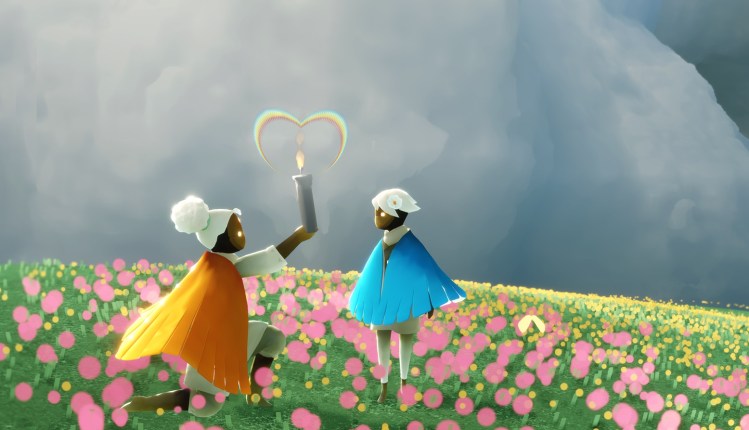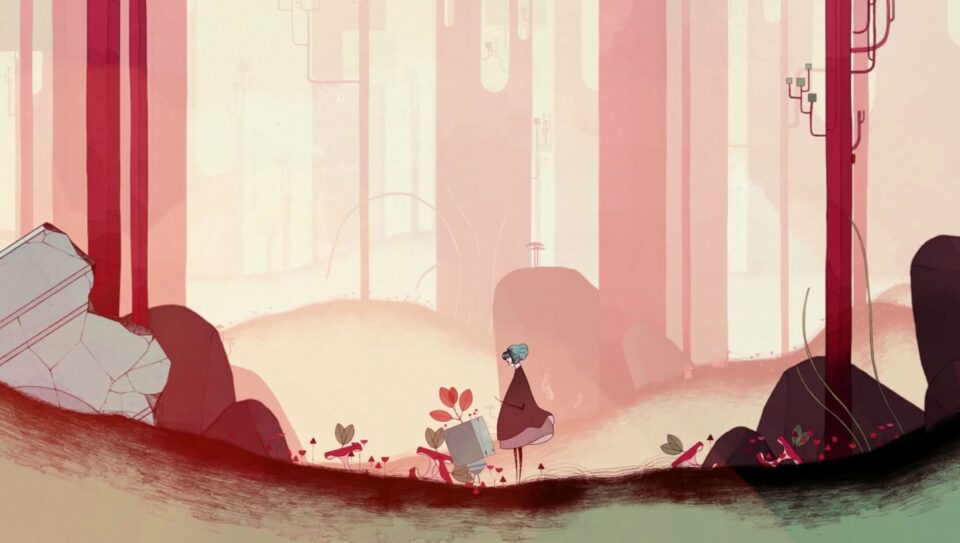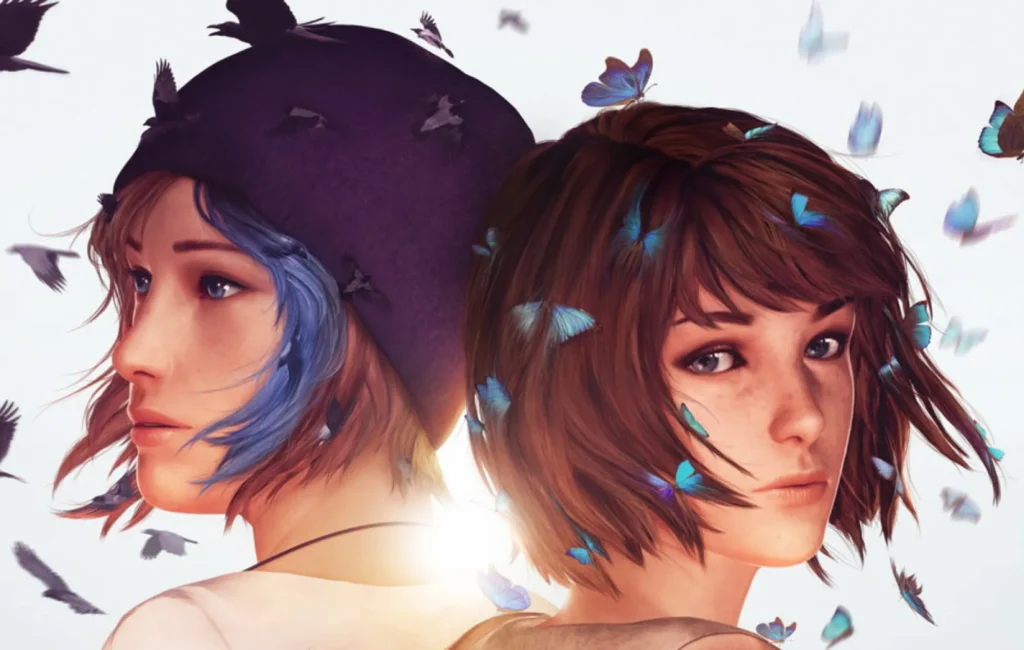“Press any button to start”
Curious, isn’t it? How video games can transport us into virtual worlds of limitless possibilities – from medieval kingdoms to dystopian cities in the far distant future. How we can get lost in the stories of characters we can identify with and whose destiny is dictated by us, the players.
As the stigma surrounding mental health began to dissipate, various mental illnesses became a recurring theme in video games. So I have selected 6 games that tackle this topic in an innovative way and, above all, have managed to make me better understand what I am going through. From compelling stories about friendship or love to difficult challenges and important narrative choices, I’m sure that all the games I will be talking about below will give you a unique perspective on mental health:
1. Sky – Children of Light

Can we find beauty in helping those around us?
Sky-Children of the Light, developed by thatgamecompany, aims to answer this question.
Confused, you wake up in an abandoned world, plunged in a deep darkness that only you still haunt. Although the solitude can be intimidating at first, the game will quickly explain that in this vast open world you can meet other players. You can join them on an adventure to find the long-lost light of this land.
What makes the game really special is the innovative gameplay loop, where the mini-stories and friendships you can form with other players, together with the dynamic music and game space, represent different stages of life and the human experience.
By immersing yourself in “Sky-Children of the Light” you can detach yourself from the daily routine of everyday life, from stress, fears, frustrations, and enter a world where all that matters is to seek, together with other people, the good and happiness.
2. Gris

A story told through color.
Gris starts with one of the most impressive sequences I have ever seen in a video game: the artwork and sound design are masterfully interwoven to capture the happiness the protagonist feels. But within seconds, Gris’ world falls apart and she is left alone. The bright colors at the beginning are replaced by a monotonous black and white reflecting the trauma experienced by the character.
As the story develops, the color palette becomes richer, portraying the inner turmoil that tries Gris. In this way, the game uses its unique artwork to illustrate the 5 stages of grief. The first level focuses on the first stage – denial, followed by anger, imagined as a red, almost infinite desert. Gris’ behavior becomes erratic, and she ends up destroying everything in her path. But once at the end of the desert, a new realm opens up for Gris – negotiation. On the third level, the scenery changes to a fairytale forest with green as the predominant color. Traces of reddish tinges can still be seen, suggesting that the stages of pain are not always linear and perfectly separable. From this point on, Gris’ destiny continues in unexpected ways, which I invite you to explore to find out how the last two stages of grief emerge and which characters join Gris’ journey.
In terms of gameplay, Gris is a sidescroller with puzzle elements. Even if at the beginning the riddles Gris has to solve are quite easy, the difficulty increases as the game progresses. I at least got stuck on several sections and found several quite complex puzzles with “outside the box” solutions.
Yet the story remains the most memorable aspect of the game. Through a range of emotions of loss, sadness, regret, anger, but also love and inner rediscovery, we learn that no matter how lonely we feel, there is always a way to hope.
3. Celeste

“This mountain might be a bit much for you.”
Celeste starts by telling the player that he probably will not finish the main quest. It is unusual for a game to begin by discouraging the player, but it is a fitting sequence when considering the story Celeste is trying to tell. Madeleine, a trans teenage girl, begins a spiritual journey of self-discovery as she attempts to climb to the top of Mount Celeste – one of the highest and most dangerous mountains in the world.
The game tells its story through the high (and sometimes frustrating) difficulty of the parkour levels, which reflect the intensity of Madeleine’s struggle with anxiety disorder and low self-esteem. Throughout the game, we witness the character’s inner development, as she gains more strength and comes to terms with herself, helped by those she meets along the way. Without going into spoiler territory, I can say that, by the end, there is a good chance you will shed a few tears.
Coming back to the gameplay itself, the platforming mechanics are fluid and intuitive: it is enjoyable to control Madeleine, and the game interface helps you understand what your objectives are and what you can do in each level. The level design is also fantastic, incorporating many creative ideas to gradually increase the difficulty, and the soundtrack perfectly complements Madeleine’s journey. Although Celeste is considered one of the hardest video games, there are many accessibility options available, so every player can customize the experience to their liking
All in all, Celeste is one of the best games I have played, both because of the platforming that remains fun and challenging throughout, and the poignant narrative thread that manages to portray a transgender character’s inner struggle with anxiety disorders and depression.
4. Night in the Woods

“Nothing is going to save us forever. But a lot of things can save us today”
Out of all the games mentioned so far, I think Night in the Woods (developed by Infinite Fall) comes with the best portrayal of mental disorders – even if the game play is not the most interesting, the story and the characters you meet along the way manage to make the game memorable.
Following a traumatic event, Mae the Cat is forced to return to her hometown. Here she meets up with all the friends from her teenage years and gets back to all the activities that once made her happy. Soon, however, the player realizes that Mae’s life is lived in the shadow of depression and anxiety, marked by feelings of isolation and loneliness. The characters around her are also affected by toxic relationships, abusive families and discrimination. Thus, the narrative thread reveals to the players how common mental disorders are, and how they systematically affect our daily lives.
As the story evolves, the characters are forced to help each other cope with difficulties. The game thus emphasizes the importance of emotional support in everyday challenges. Finally, the game also brings to the forefront the different ways in which the characters try to avoid confronting the mental disorders they suffer from – another type of behavior often encountered in reality.
Night in the Woods has stayed with me for its stark but very truthful portrayal of lives affected by mental disorders, and I easily recommend it to anyone who wants a deeper understanding of these conditions.
5. Life is strange

“Sometimes when you meet someone who’s going to change your life… You just know it, I guess.”
Life is Strange is a game about choices. From mundane choices between what to eat for lunch or who to spend your free time with after school, to choices that can change the course of humanity. The Dontnod Entertainment team’s game is distinguished by the player’s ability to influence the events of the story, dictating the choices of the protagonist, Max.
As in Night in the Woods, Max returns to her hometown, where she reconnects with her childhood best friend Chloe, who dies soon after. Following this traumatic event, Max gains the power to turn back time to save her friend.
What follows is an impressive story, full of supernatural elements, in which Max has to find out more about her friend’s past in order to save her life. That is where the main mechanic comes in: Max’s choices, which can help Chloe manage her depression and anxiety.
The friendship between the two teens is developed throughout the story, and I was captivated by the characters and Max’s journey. What struck me most is the way the game deals with mental health – people suffering alone from depression or anxiety are portrayed with compassion, and players are encouraged to discover the importance of friendship and how they can offer support to loved ones in crisis.
6. Depression Quest

We all know what depression is, right?
I would say no. Depression has certainly become a buzzword that most people can recognize, but few know exactly what the disorder is.
Depression Quest is a browser-based game that aims to raise awareness of mental disorders and simulate the experiences of an average person suffering from depression.
As a player, you will receive a daily summary of your character’s state of mind, along with what you have done during the day and what decisions you have to make in the future. Some decisions or dialog options are inaccessible, to illustrate how depression or social anxiety can paralyze you in the face of seemingly trivial situations and affect your functionality in everyday life.
The game illustrates how difficult it is to cope with these disorders on a daily basis, but it also reminds you that most of the time you are not alone and that there is hope, even if it seems impossible to believe at the time.
.
That was quite a list! All the games we have talked about are exceptional, using fictional worlds with compelling stories and complex mechanics to shed light on the struggle with the most common mental disorders. By stepping into the shoes of 6 characters who are dealing with these conditions, at the end of the day I am left with the realization that I do not have to face them alone, and I feel more comfortable asking for help. I hope they resonate with you in a similar way.
.
Thanks to our Discord server community for the recommendations! If you have played other games with mental health themes, or that have helped you through more difficult times, you can write to us on email or social media and we will add them to our list of recommendations.


